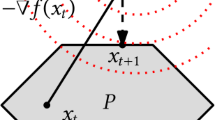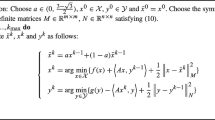Abstract
This paper considers an inexact primal-dual algorithm for semi-infinite programming (SIP) for which it provides general error bounds. We create a new prox function for nonnegative measures for the dual update, and it turns out to be a generalization of the Kullback-Leibler divergence. We show that, with a tolerance for small errors (approximation and regularization error), this algorithm achieves an \({\mathcal {O}}(1/\sqrt{K})\) rate of convergence in terms of the optimality gap and constraint violation, where K is the total number of iterations. We then use our general error bounds to analyze the convergence and sample complexity of a specific primal-dual SIP algorithm based on Monte Carlo sampling. Finally, we provide numerical experiments to demonstrate the performance of this algorithm.


Similar content being viewed by others
References
Aliprantis CD, Border KC (2006) Infinite dimensional analysis. A hitchhiker’s guide. Springer, Berlin
Anstreicher KM, Wolsey LA (2009) Two “well-known” properties of subgradient optimization. Math Program 120(1):213–220
Betrò B (2004) An accelerated central cutting plane algorithm for linear semi-infinite programming. Math Program 101(3):479–495
Bhat N, Farias V, Moallemi CC (2012) Non-parametric approximate dynamic programming via the kernel method. In: Advances in neural information processing systems, pp 386–394
Bishop CM (2006) Pattern recognition and machine learning. Springer, Berlin
Bonnans JF, Shapiro A (2013) Perturbation analysis of optimization problems. Springer, Berlin
Bruck RE Jr (1977) On the weak convergence of an ergodic iteration for the solution of variational inequalities for monotone operators in hilbert space. J Math Anal Appl 61(1):159–164
Calafiore G, Campi MC (2005) Uncertain convex programs: randomized solutions and confidence levels. Math Program Ser A 102:25–46
Campi MC, Garatti S (2008) The exact feasibility of randomized solutions of uncertain convex programs. SIAM J Optim 19(3):1211–1230
de Farias DP, Van Roy B (2004) On constraint sampling in the linear programming approach to approximate dynamic programming. Math Oper Res 29(3):462–478
Dentcheva D, Ruszczynski A (2003) Optimization with stochastic dominance constraints. SIAM J Optim 14(2):548–566
Dentcheva D, Ruszczyński A (2009) Optimization with multivariate stochastic dominance constraints. Math Program 117(1):111–127
Dentcheva D, Wolfhagen E (2015) Optimization with multivariate stochastic dominance constraints. SIAM J Optim 25(1):564–588
Duchi J (2016) Introductory lectures on stochastic optimization. Park City Mathematics Institute, Graduate Summer School Lectures
Esfahani PM, Sutter T, Lygeros J (2015) Performance bounds for the scenario approach and an extension to a class of non-convex programs. IEEE Tran Autom Control 60(1):46–58
Fan K (1953) Minimax theorems. Proc Natl Acad Sci 39(1):42–47
Fonseca I, Leoni G (2007) Modern methods in the calculus of variations: \(Lp\) Spaces. Springer, Berlin
Goberna MA, Lopez MA (2002) Linear semi-infinite programming theory: an updated survey. Eur J Oper Res 143(2):390–405
Goberna MÁ, López MA (2013) Semi-infinite programming: recent advances, vol 57. Springer, Berlin
Goberna MA, López MA (2017) Recent contributions to linear semi-infinite optimization. 4OR 15(3):221–264
Gramlich G, Hettich R, Sachs EW (1995) Local convergence of sqp methods in semi-infinite programming. SIAM J Optim 5(3):641–658
Gribik PR (1979) A central-cutting-plane algorithm for semi-infinite programming problems. In: Semi-infinite Programming. Springer, Berlin, pp 66–82
Gustavsson E, Patriksson M, Strömberg A-B (2015) Primal convergence from dual subgradient methods for convex optimization. Math Program 150(2):365–390
Haskell WB, Shanthikumar JG, Shen ZM (2013) Optimization with a class of multivariate integral stochastic order constraints. Ann Oper Res 206(1):147–162
Haskell WB, Shanthikumar JG, Shen ZM (2017) Primal-dual algorithms for optimization with stochastic dominance. SIAM J Optim 27(1):34–66
Hettich R, Kortanek KO (1993) Semi-infinite programming: theory, methods, and applications. SIAM Rev 35(3):380–429
Hu J, Mello TH, Mehrotra S (2012) Sample average approximation of stochastic dominance constrained programs. Math Program 133(1):171–201
Ito S, Liu Y, Teo KL (2000) A dual parametrization method for convex semi-infinite programming. Ann Oper Res 98(1):189–213
Kiwiel KC, Larsson T, Lindberg PO (2007) Lagrangian relaxation via ballstep subgradient methods. Math Oper Res 32(3):669–686
Kortanek KO, No H (1993) A central cutting plane algorithm for convex semi-infinite programming problems. SIAM J Optim 3(4):901–918
Lan G, Nemirovski A, Shapiro A (2012) Validation analysis of mirror descent stochastic approximation method. Math Program 134(2):425–458
Larsson T, Patriksson M, Strömberg A-B (1999) Ergodic, primal convergence in dual subgradient schemes for convex programming. Math Program 86(2):283–312
Li D-H, Qi L, Tam J, Soon-Yi W (2004) A smoothing newton method for semi-infinite programming. J Glob Optim 30(2–3):169–194
Ling C, Ni Q, Qi L, Soon-Yi W (2010) A new smoothing newton-type algorithm for semi-infinite programming. J Global Optim 47(1):133–159
Lin Q, Nadarajah S, Soheili N (2017) Revisiting approximate linear programming using a saddle point based reformulation and root finding solution approach
Liu Y, Teo KL (2002) An adaptive dual parametrization algorithm for quadratic semi-infinite programming problems. J Global Optim 24(2):205–217
Liu Y, Teo KL, Wu S-Y (2004) A new quadratic semi-infinite programming algorithm based on dual parametrization. J Global Optim 29(4):401–413
López M, Still G (2007) Semi-infinite programming. Eur J Oper Res 180(2):491–518
Luenberger DG (1997) Optimization by vector space methods. Wiley, New York
MacKay DJC (2003) Information theory, inference and learning algorithms. Cambridge University Press, Cambridge
Mahdavi M, Yang T, Jin R (2012) Online stochastic optimization with multiple objectives. arXiv preprint arXiv:1211.6013
Mehrotra S, Papp D (2014) A cutting surface algorithm for semi-infinite convex programming with an application to moment robust optimization. SIAM J Optim 24(4):1670–1697
Mello TH, Mehrotra S (2009) A cutting-surface method for uncertain linear programs with polyhedral stochastic dominance constraints. SIAM J Optim 20(3):1250–1273
Mohajerin Esfahani P, Sutter T, Kuhn D, Lygeros J (2017) From infinite to finite programs: explicit error bounds with applications to approximate dynamic programming. arXiv preprint arXiv:1701.06379
Nedić A, Ozdaglar A (2009) Approximate primal solutions and rate analysis for dual subgradient methods. SIAM J Optim 19(4):1757–1780
Nedić A, Ozdaglar A (2009) Subgradient methods for saddle-point problems. J Optim Theory Appl 142(1):205–228
Ni Q, Ling C, Qi L, Teo KL (2006) A truncated projected newton-type algorithm for large-scale semi-infinite programming. SIAM J Optim 16(4):1137–1154
Noyan N, Rudolf G (2013) Optimization with multivariate conditional value-at-risk constraints. Oper Res 61(4):990–1013
Noyan N, Rudolf G (2018) Optimization with stochastic preferences based on a general class of scalarization functions. Oper Res 66:463–486
Pinsker MS (1964) Information and information stability of random variables and processes. Holden-Day, San Francisco
Qi L, Wu S-Y, Zhou G (2003) Semismooth newton methods for solving semi-infinite programming problems. J Global Optim 27(2–3):215–232
Qi L, Ling C, Tong X, Zhou G (2009) A smoothing projected newton-type algorithm for semi-infinite programming. Comput Optim Appl 42(1):1–30
Reemtsen R (1991) Discretization methods for the solution of semi-infinite programming problems. J Optim Theory Appl 71(1):85–103
Reemtsen R, Görner S (1998) Numerical methods for semi-infinite programming: a survey. In Semi-infinite programming, Springer, pp 195–275
Robert C, Casella G (2004) Monte Carlo statistical methods. Springer, New York
Shapiro A (2009) Semi-infinite programming, duality, discretization and optimality conditions. Optimization 58(2):133–161
Still G (2001) Discretization in semi-infinite programming: the rate of convergence. Math Program 91(1):53–69
Zhang L, Wu S-Y, López MA (2010) A new exchange method for convex semi-infinite programming. SIAM J Optim 20(6):2959–2977
Author information
Authors and Affiliations
Corresponding author
Additional information
Publisher's Note
Springer Nature remains neutral with regard to jurisdictional claims in published maps and institutional affiliations.
Rights and permissions
About this article
Cite this article
Wei, B., Haskell, W.B. & Zhao, S. An inexact primal-dual algorithm for semi-infinite programming. Math Meth Oper Res 91, 501–544 (2020). https://doi.org/10.1007/s00186-019-00698-2
Received:
Revised:
Published:
Issue Date:
DOI: https://doi.org/10.1007/s00186-019-00698-2




